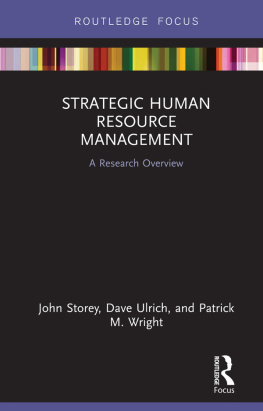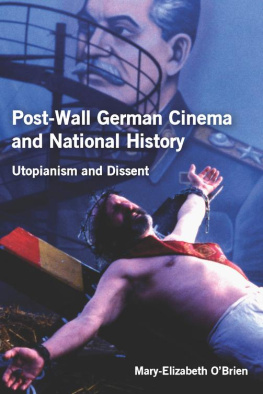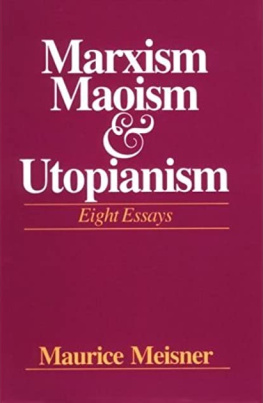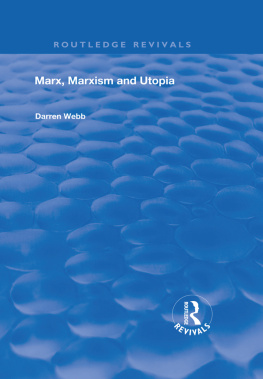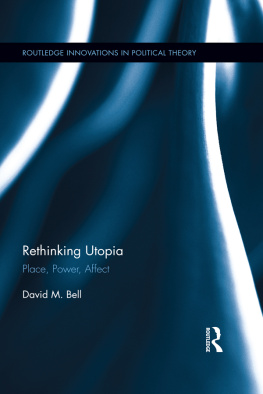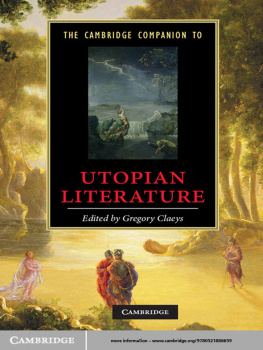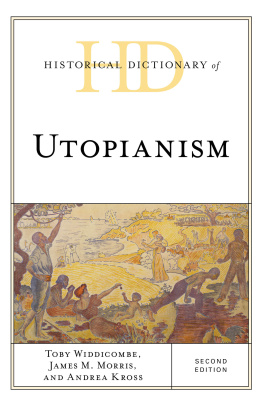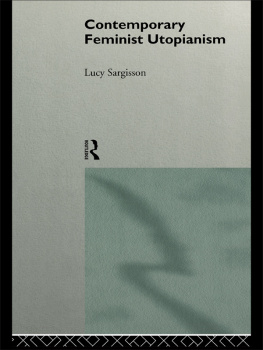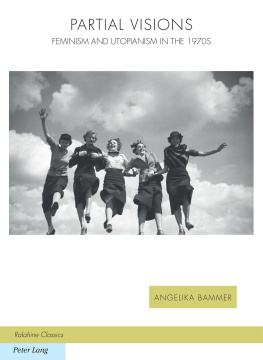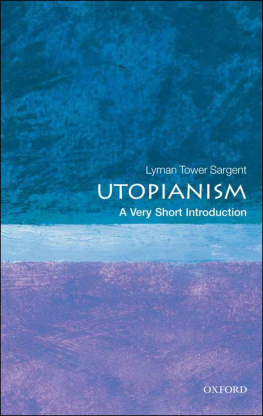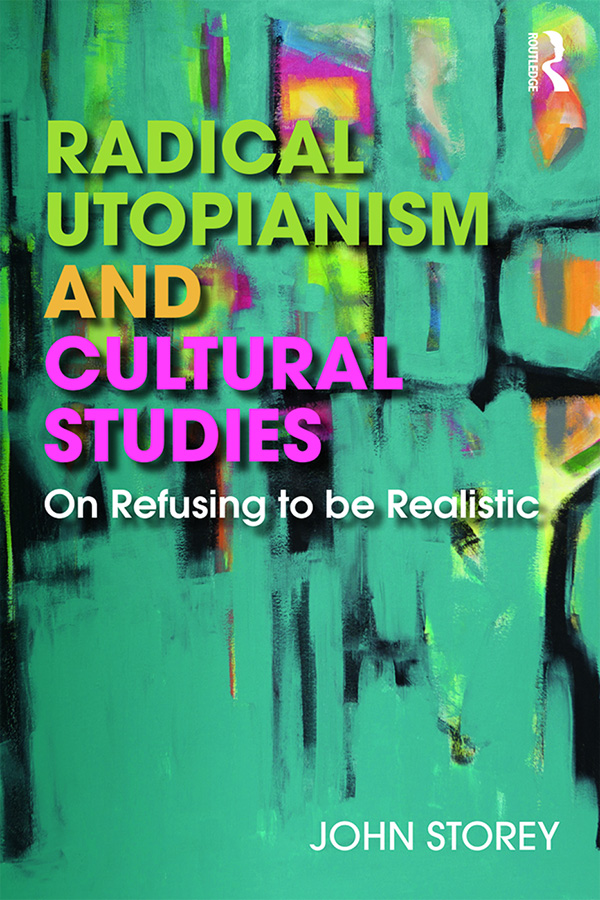Contents
Page List
RADICAL UTOPIANISM AND CULTURAL STUDIES
In Radical Utopianism and Cultural Studies, John Storey looks at the concept of utopianism from a cultural studies perspective and argues that radical utopianism can awaken the political promise of cultural studies.
Between the Preface and the Postscript, there are seven chapters which explore different aspects of radical utopianism. This book begins with a definition of what radical utopianism means, with its productive combination of defamiliarization and desire. From there, it considers Thomas Mores invention of the concept of utopia with its double articulation of what is and what could be, Herbert Marcuses utopian rereading of Sigmund Freuds concept of repression, Gerrard Winstanley and the Diggers, the Paris Commune, and the Haight-Ashbury counterculture. In the final chapter, Storey examines two versions of utopian capitalism: retro and post. Although the main focus here is on Donald Trumps presidential election campaign and Paul Masons recent bestseller Postcapitalism, the chapter begins with a brief discussion of Karl Marx on capitalism. Each chapter, in a different way, argues that radical utopianism defamiliarizes the manufactured naturalness of the here and now, making it conceivable to believe that another world is possible.
This book provides an ideal introduction to utopianism for students of cultural studies as well as students within a number of related disciplines such as sociology, literature, history, politics, and media studies.
John Storey is Emeritus Professor of Cultural Studies at the Centre for Research in Media and Cultural Studies, University of Sunderland, UK. He has published extensively in cultural studies, including 13 books.
RADICAL UTOPIANISM AND CULTURAL STUDIES
On Refusing to be Realistic
John Storey

First published 2019
by Routledge
2 Park Square, Milton Park, Abingdon, Oxon OX14 4RN
and by Routledge
52 Vanderbilt Avenue, New York, NY 10017
Routledge is an imprint of the Taylor & Francis Group, an informa business
2019 John Storey
The right of John Storey to be identified as author of this work has been asserted by him in accordance with sections 77 and 78 of the Copyright, Designs and Patents Act 1988.
All rights reserved. No part of this book may be reprinted or reproduced or utilised in any form or by any electronic, mechanical, or other means, now known or hereafter invented, including photocopying and recording, or in any information storage or retrieval system, without permission in writing from the publishers.
Trademark notice: Product or corporate names may be trademarks or registered trademarks, and are used only for identification and explanation without intent to infringe.
British Library Cataloguing-in-Publication Data
A catalogue record for this book is available from the British Library
Library of Congress Cataloging-in-Publication Data
Names: Storey, John, 1950 author.
Title: Radical utopianism and cultural studies: on refusing to be realistic / John Storey.
Description: Abingdon, Oxon; New York, NY: Routledge, 2019. | Includes bibliographical references and index.
Identifiers: LCCN 2018049503 (print) | LCCN 2018051480 (ebook) | ISBN 9781315201580 (ebook) | ISBN 9781138706866 (hardback: alk. paper) | ISBN 9781138706873 (pbk.: alk. paper)
Subjects: LCSH: Utopias. | CultureStudy and teaching.
Classification: LCC HX806 (ebook) | LCC HX806 .S758 2019 (print) | DDC 335/.02dc23
LC record available at https://lccn.loc.gov/2018049503
ISBN: 978-1-138-70686-6 (hbk)
ISBN: 978-1-138-70687-3 (pbk)
ISBN: 978-1-315-20158-0 (ebk)
Typeset in Bembo
by codeMantra
For Charlie, Jenny, Lily, and Thomas: refuse to be realistic, demand the impossible.
And in memory of the utopians of Guildford Road, Dutch, English and Russian.
All liberation depends on the consciousness of servitude
(Herbert Marcuse)
Revolutions spring not from despair, but from rising expectations
(Tony Cliff)
If I hadnt seen such riches, I could live with being poor
(Tim Booth)
CONTENTS
Some of the ideas and arguments in this book have been presented to audiences in Bochum, Murcia, Paderborn, Sunderland, and Xian. I am grateful to all those who made interesting points and asked difficult questions.
Although this is my 13th book, I have thought about writing it since I was an undergraduate. My BA dissertation was originally going to be a study of Gerrard Winstanley and the Diggers. Antony Easthope persuaded me to change to a dissertation on Pierre Macherey. I do not regret this change, as it prepared the ground for most of my other published work, but in writing this book, I have returned to something I never really left. When I began my renewed conceptual journey into utopia, I found one book absolutely invaluable, Ruth Levitas The Concept of Utopia (see the References for details). I cannot recommend her work highly enough.
I would like to thank Natalie Foster and Jen Vennall at Routledge for their support and patience throughout the writing of this book. There must have been times when they thought the whole project was hopelessly utopian. I would also like to thank Madam P for giving permission to use her wonderful painting The First Day.
Finally, my thanks go to family and friends for their support and encouragement throughout, and especially to Charlie for his own version of utopian defamiliarization.
One of the aims of this book is to return the concept of utopianism to the meaning it was given when Thomas More invented the word utopia in 1516. Although for More, Utopia is an imaginary island and a Utopian is an inhabitant of that island, there is a more general sense, as I shall explore in in this volume) and that they can be made to mean different things in different contexts. Rather, I want to unfix it from what has become, after more than 500 years of ideological work, its uni-accentual meaning as another word for impossible and unrealistic, and therefore, a key word in an extensive vocabulary of concepts intended to discourage political imagination and make radical change seem inconceivable. In the course of doing this, I will also challenge the uni-accentual certainty of impossible and unrealistic.
Radical utopianism was an important concept for two of the founding figures of British cultural studies, EP Thompson and Raymond Williams. In 1976, in the revised edition of William Morris: Romantic to Revolutionary, Thompson introduced into English Miguel Abensours concept of the education of desire. This has had a profound impact on what has become known as utopian studies but has had hardly any influence on cultural studies. Abensours concept is discussed in in this volume). Similarly, its impact on cultural studies has been almost non-existent.
As already indicated, Thompson and Williams interest in radical utopianism converged on the work of William Morris (Williams 1993, Thompson 1976), who Thompson eventually celebrated as a utopian communist (1976: 788). They both learned from Morris the importance of the dual radical utopian impulse, conscious hope (Morris 1986: 180), and the teaching of desire, educating people into desiring it (138). For Morris, the production of utopian desire, as a result of the interrogation of the here and now from the perspective of an alternative social space, would, according to Thompson, help people to find out their wants, to encourage them to want more, to challenge them to want differently, and to envisage a society of the future in which people, freed at last of necessity, might choose between different wants (1976: 806). Morris called this process Education for Revolution (quoted in Thompson 1976: 410).


